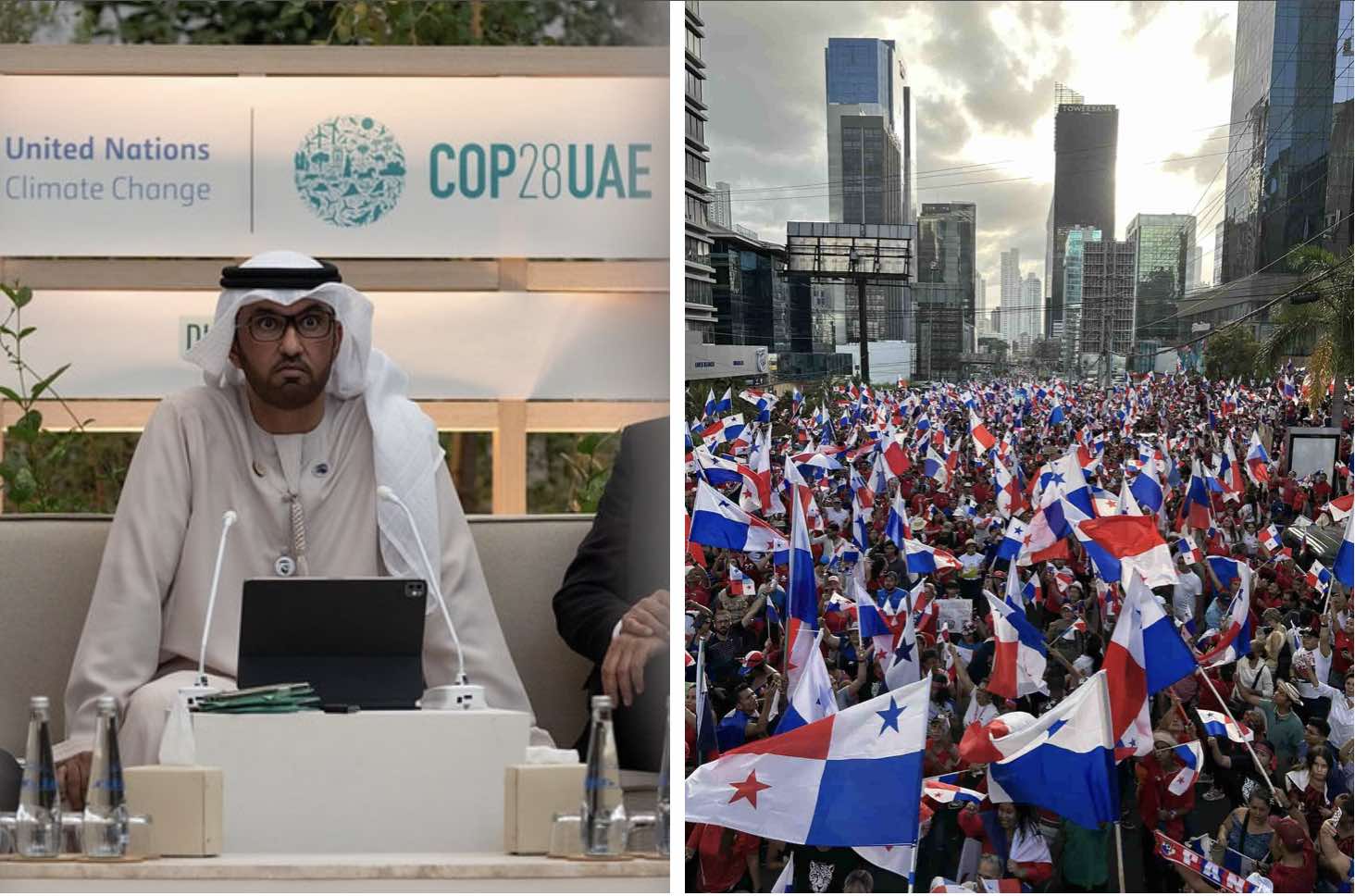
The COP28 President attends a meeting in Dubai on the day the people of Panama celebrate their Supreme Court closing an ecocidal copper mine.
This issue: Panama vs Copper Mine | UAE’s Land Grab in Africa | XR Bolivia
Dear rebel,
If a rehab centre was letting in drug dealers, you’d question its commitment. If that rehab centre was being run by a drug cartel, you’d give up all hope entirely.
It sounds ludicrous, but that is the relationship between the world’s premier climate summit and the fossil fuel industry. A record 2,456 fossil fuel lobbyists were let into COP28 in the United Arab Emirates, and the man in charge of the conference is the CEO of the host nation’s oil company.
The UN conference where the world should be uniting to end the fossil fuel industry has instead become a space for oil companies to do secret business deals and deny the scientific reality that fossil fuel use must end.
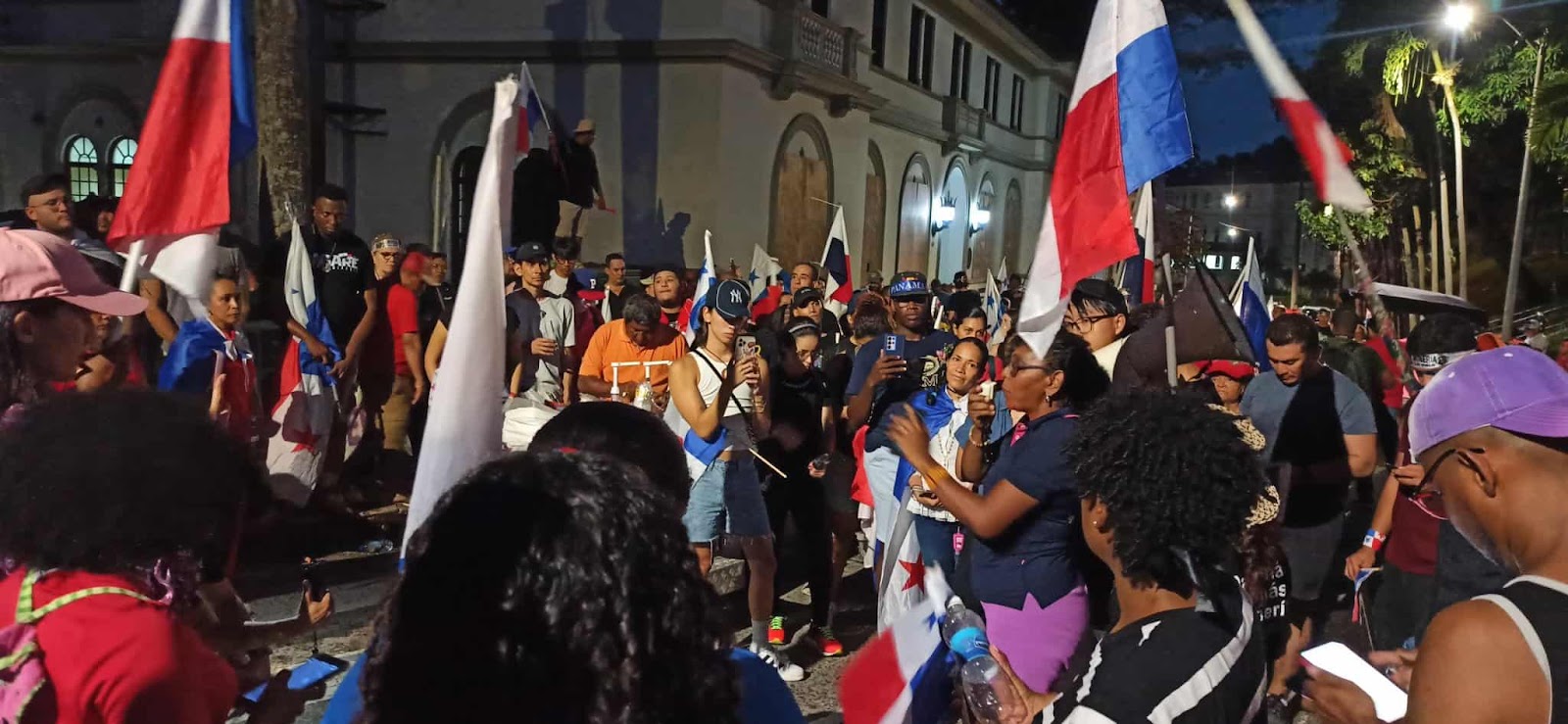
Panamanians rally outside their Supreme Court as it decides whether to close a copper mine so unpopular it caused hundreds of thousands to take to the streets.
In a Special Report, we expose the truth behind the UAE’s roadmap to ‘solving’ the climate crisis without dismantling its oil industry, showing how its purchase of a vast region of Kenyan forest for a carbon credit scheme is resulting in the brutal mass evictions of the indigenous people living there.
In better news, Action Highlights focuses on a wave of protest in South America that is building in Bolivia and led to a historic victory for the people of Panama, where the Supreme Court has ruled that a giant ecocidal copper mine must close.
The victory in Panama came at great human cost - activists were shot by motorists and blinded by police. But it is proof that peaceful protest can overcome corporate interests and reshape our politics in a way that climate summits currently cannot.
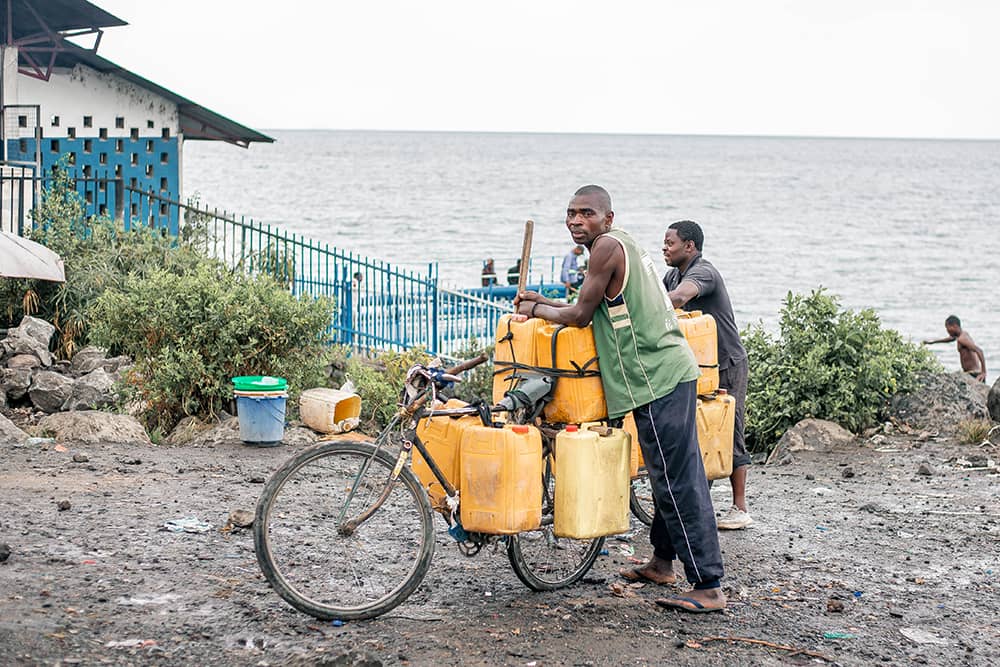
A man draws water to sell from Lake Kivu in Goma, DRC, both a source of drinking water and an unstable store of greenhouse gases. This image by @bienfaitcn was 1st place in the XR Global Photography Contest - see more in Announcements.
That doesn’t mean we can ignore COP, even as preparations are underway for another petrostate, Azerbaijan, to host the summit next year. The planet is heating too quickly to completely abandon our best chance of a unified global response.
Instead, we must call out world leaders who try to legitimise the car crash that was COP28, and demand fundamental reform to how the summit is run. It’s time for the UN to shut the door to fossil fuel lobbyists, and limit the voting and hosting rights of oil states once and for all.
Drug dealers and drug cartels be damned. Let the rehab centre do its work.
This newsletter is available in multiple languages. Use the globe icon (top right) to change language.
This newsletter is brought to you by XR Global Support, a worldwide network of rebels who help our movement grow. We need money for this crucial work.
Contents
- Action Highlights: Victory in Panama, XR Bolivia vs Forest Fires
- Action Round Up: Indonesia, Serbia, UK, South Africa, Uganda, India, Spain, Finland, South Korea, Australia, Sweden, Italy
- Special Report: Kenyans Erased so UAE Can Greenwash
- Must Reads: Roger Hallam, XR Netherlands, UAE Gas Flaring, Colonial Emissions, 1% Emissions
- Announcements: XR Global Photography Contest Results
Action Highlights
People Power! Panama Stops The Mining!
28 NOVEMBER | Panama City, Panama
Victory! The people of Panama have won an almighty battle against the mining industry. After weeks of nationwide protests against a huge ecocidal copper mine, Panama’s Supreme Court has ruled the mine must shut down, and its Congress has issued a moratorium on all new mining.
The protests drew in hundreds of thousands of Panamanians, angered by years of corruption between the government and the mining sector. The Canadian owned copper mine was operating with no state oversight, and the pollution was so out of control that indigenous communities were drinking toxic groundwater while mine employees had bottled water flown in.
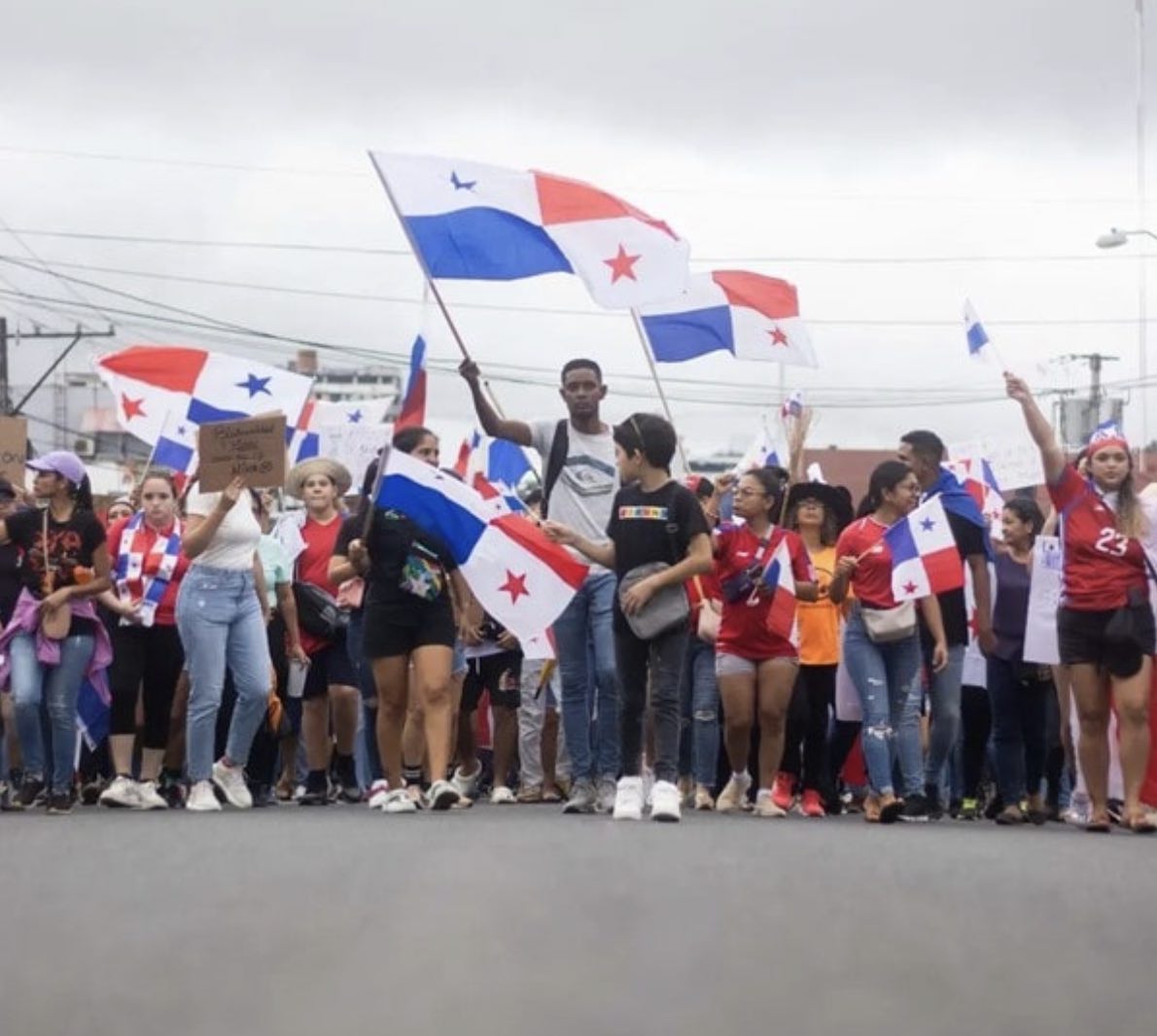
Protesters march through the streets of La Chorrera city in central Panama.
The campaign included motorway blockades, a shutdown of the copper mine’s port using small boats, and culminated in a march through Panama City attended by 250,000 people. But it was all sparked by smaller protests last year, organised by environmental organisations like Ya es Ya! (the Panamanian chapter of Scientist Rebellion) and Panamá sin Minería as well as workers’ unions.
The protests pulsed with a special cultural character that meant dancing and music were just as important as marching and blockades. But they were also sites of great tragedy. While the protesters remained peaceful, police and some motorists reacted with appalling violence.
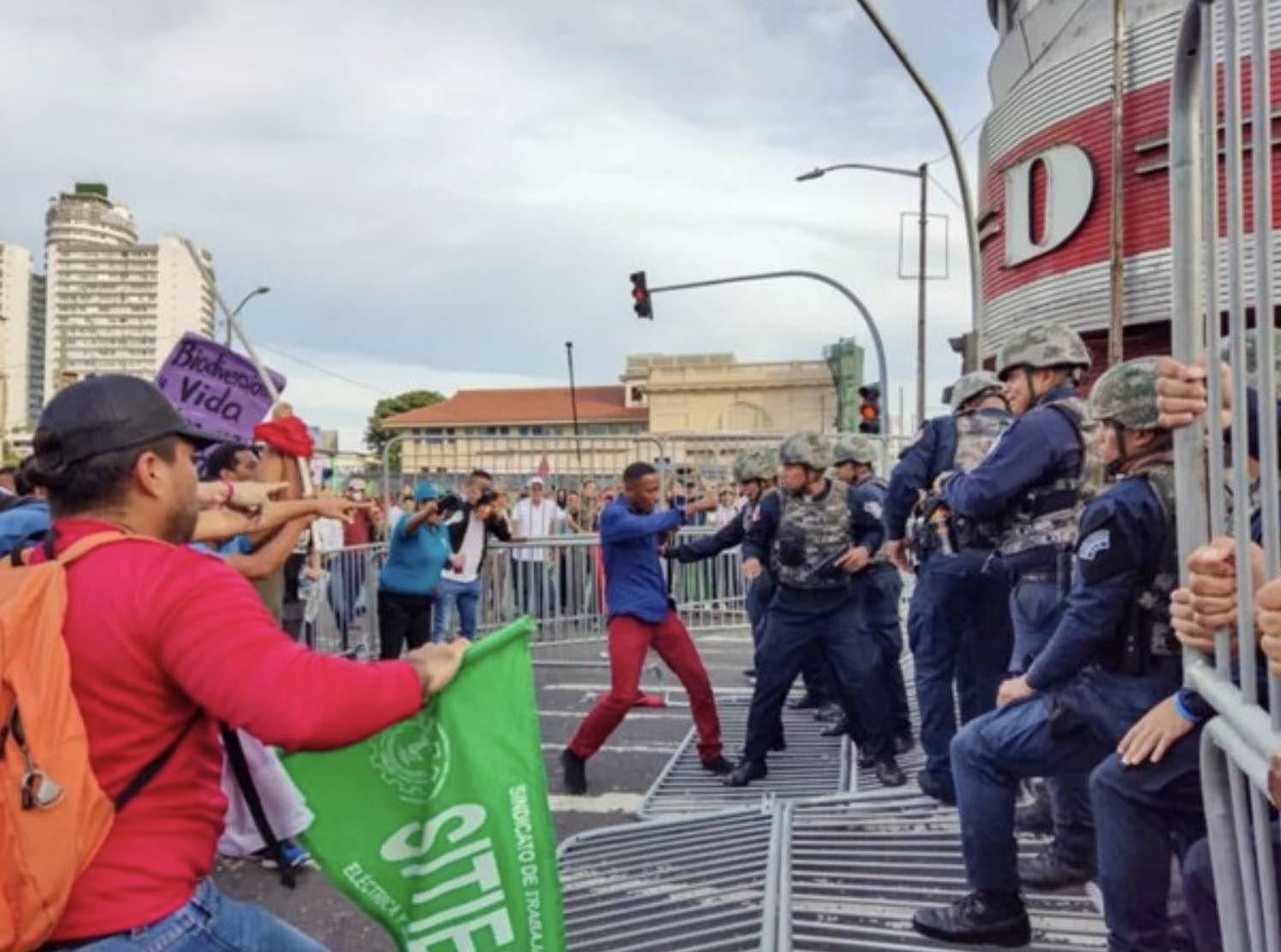
Police used extreme violence and expired tear gas to try to end the protests.
Five protesters were killed, two shot to death by an American whose car was blocked on the Pan-American Highway. Several protesters were also partially or wholly blinded by police, among them a photojournalist and two children.
The people of Panama have overcome shocking acts of violence to claim an astonishing win, and have vowed to continue their campaign by targeting other ecocidal mines. Their bravery and persistence should inspire us all.
Follow Ya es Ya! on Instagram and Twitter.
Rebels Rise Up as Bolivia Burns
NOVEMBER | La Paz, Bolivia
November has been an active month for XR Bolivia, who have been co-organising large weekly actions in the capital against widespread ecological and social injustices blighting the country.
Vast forest fires exacerbated by a severe drought have consumed around 3 million hectares of Bolivian forest, destroying dozens of indigenous communities and countless ecosystems, and closing schools nationwide due to the smoke.
Yet the government has done nothing to stop the slash-and-burn farming methods igniting them, and is also facing protests by mining unions who want to extract gold from protected natural reserves.
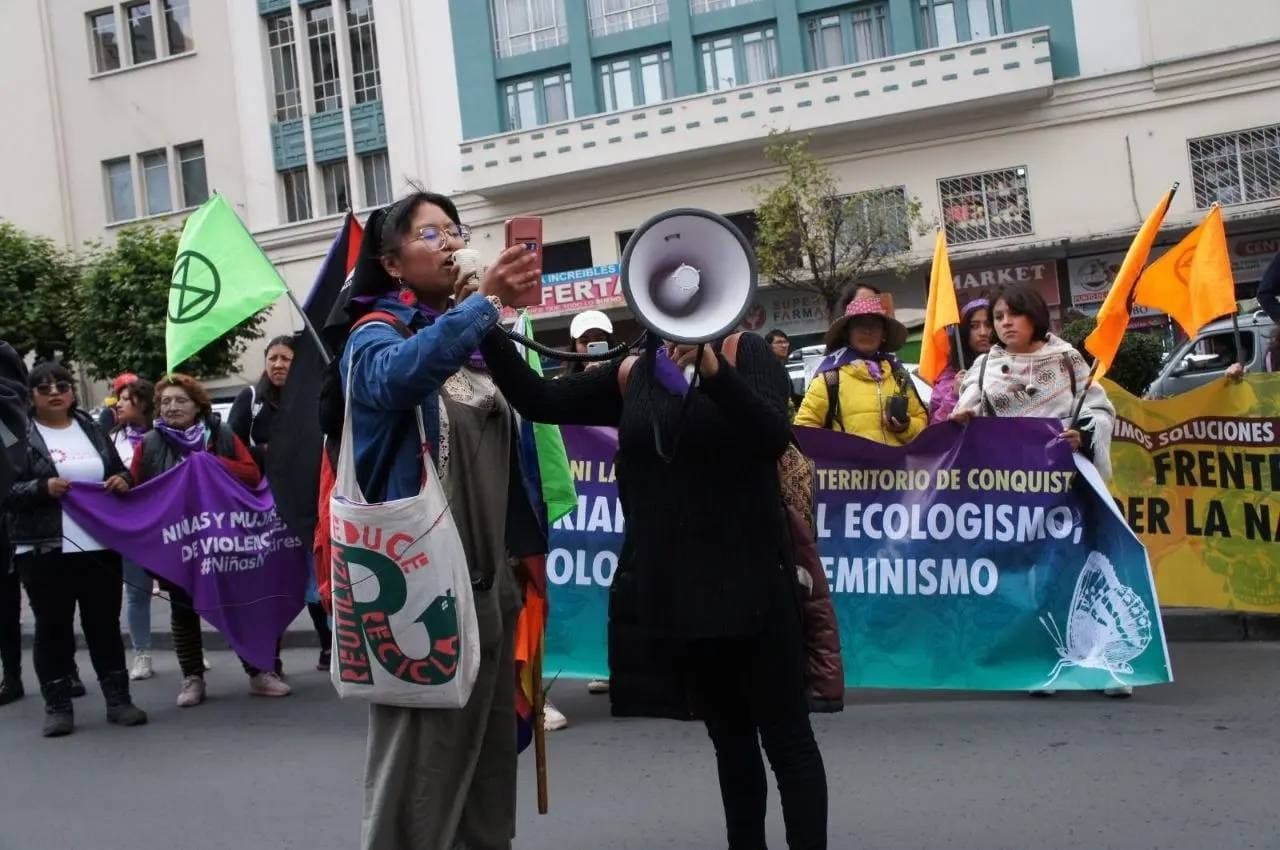
XR Warmis highlight the cost of the climate crisis to women. Banner: Not earth nor women are territory for conquests. Depatriarchise environmentalism. Ecologise feminism.
In the first week of November, rebel activists marched to the Vice-Presidency building in the city centre to call on the government to repeal the ‘incendiary laws’ that relaxed restrictions on forest clearing, and to resist the demands of the miners.
Later in the month, more than 100 protesters gathered in front of the Ministry of Fire Defence to demand the government declare a national disaster and provide more resources for volunteer firefighters.
On the final weekend of the month, XR Warmis (XR Women) rallied through the streets of the capital to highlight how women are more vulnerable to the climate crisis, with gender-based violence, harassment, and trafficking all more likely in the aftermath of extreme weather disasters.
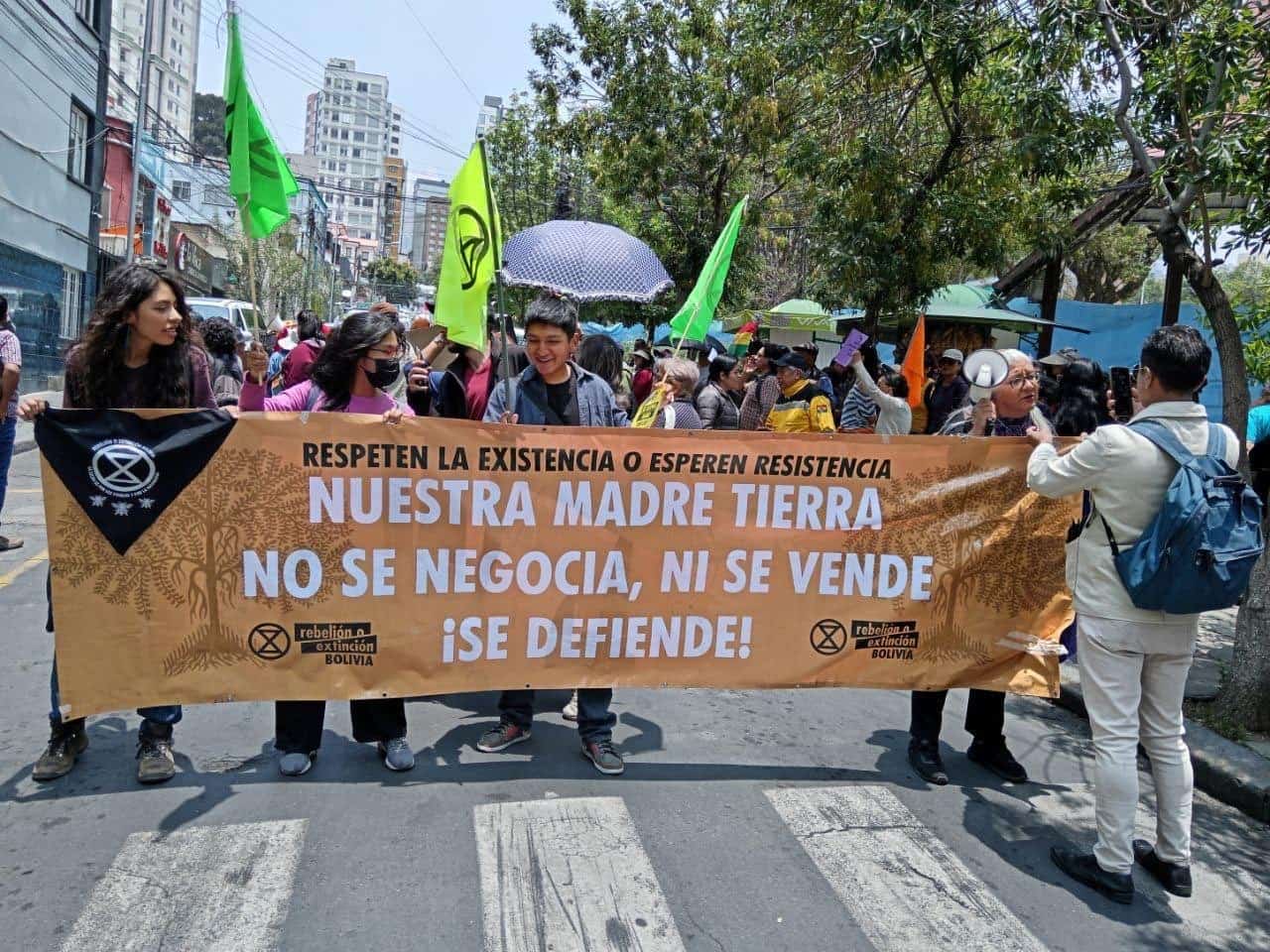
Rebels rally through La Paz against forest fires and mining concessions. Banner: Our mother earth won’t be negotiated or sold, it will be defended!
XR Bolivia was started two years ago by people in La Paz hungry for a new way to do activism. “We wanted to change the perspective on activism here in Bolivia, because it was mostly done by NGOs or in a very passive way,” says a co-founder.
“We quickly gained attention nationwide and were joined by a lot of people who have been activists for a long time and were also looking for this radical change.”
Most of its members are involved with sister groups like XR Warmis, Scientist Rebellion and Debt For Climate, and XR Bolivia also works in alliance with various regional ecoactivist, ecofeminist and indigenous groups.
“We work from a decolonised perspective”, says the co-founder. “Part of that is the direct work we do with indigenous people, who are most affected by environmental destruction. We don’t want to be their voice, but a channel for their voices to be heard.”
Follow XR Bolivia on Instagram and TikTok.
Special Report
Kenyans Erased So UAE Can Greenwash
NOVEMBER | Sasimwani, Kenya
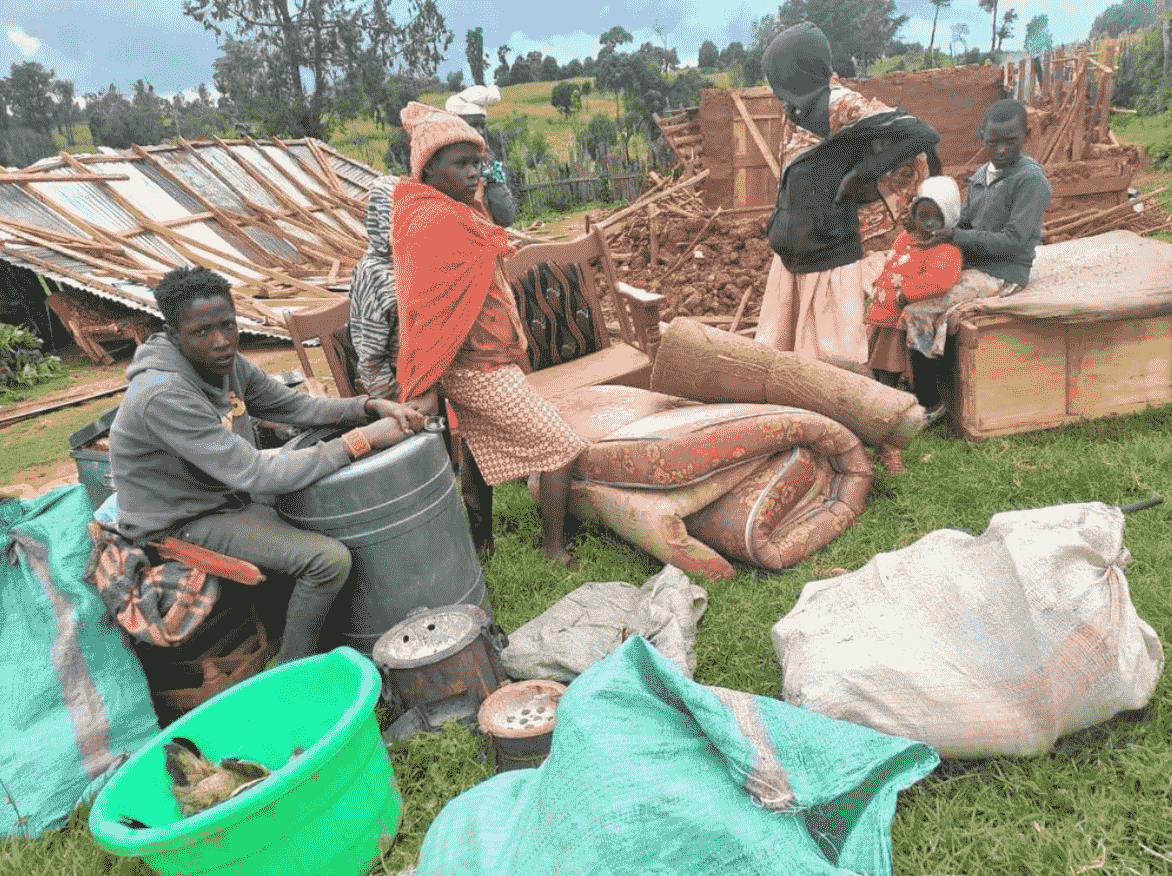
An Ogiek family retrieves belongings from their destroyed home. Photo: OPDP
The carbon market gives a licence to pollute, paid in blood. What else can we conclude when corporations and nation states can claim to offset their pollution by "protecting" forests, and in the process evict indigenous communities?
The UAE’s hunger for carbon credits is causing the violent eviction of hundreds of thousands of indigenous people in Kenya. With the support of a US consultancy firm, UAE carbon trading companies pledged to invest $450 million in credits at the recent African Climate Summit in Nairobi. A stipulation of their agreement with the Kenyan government was to reduce emissions from any forests protected by the scheme, and the Kenyan president then ordered the eviction of all people living in them.
The destruction of homes by forest rangers has already started in the Mau Forest, despite court orders ruling that the indigenous Ogiek people living there have community rights over their land and cannot be evicted.
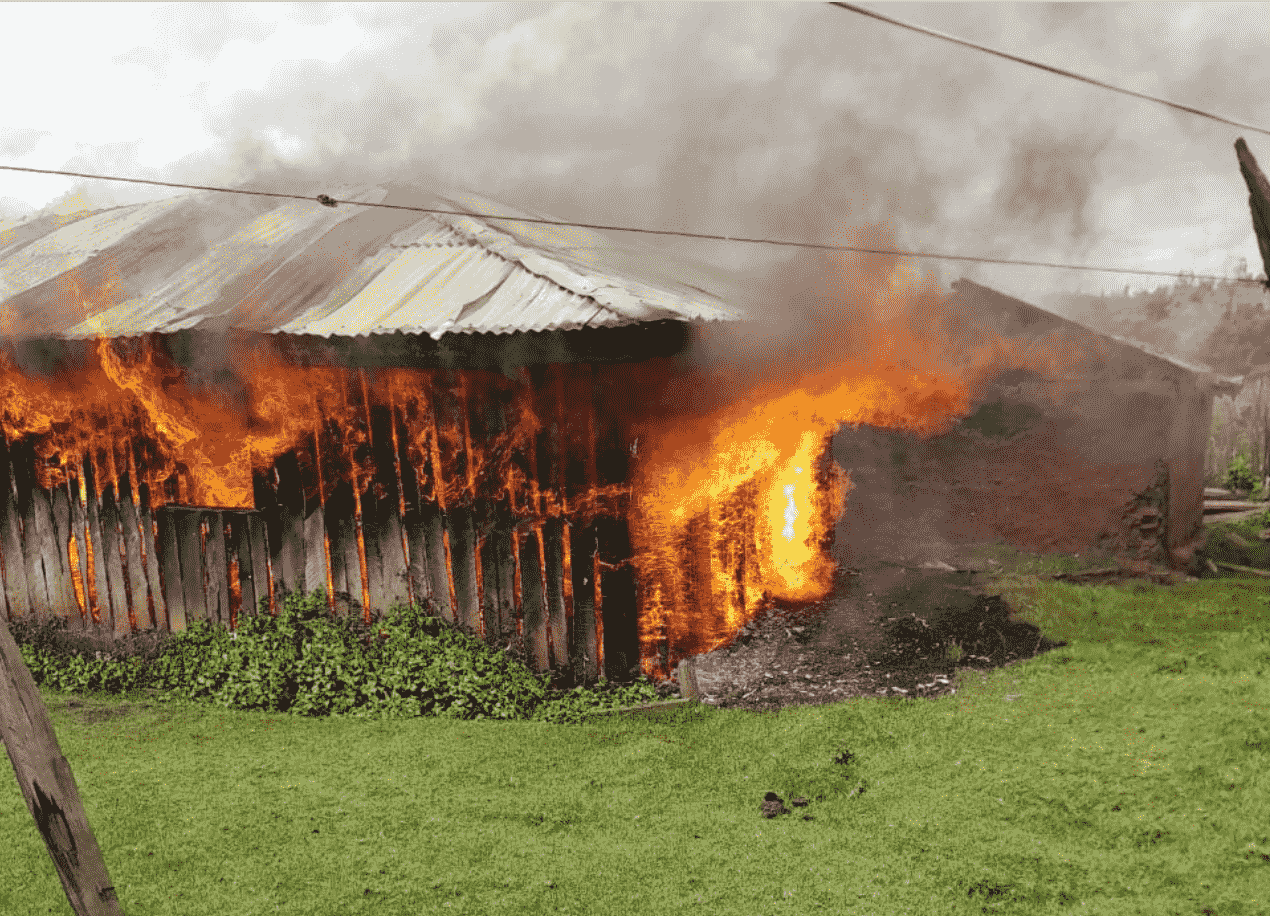
Villages burn on Ogiek land ‘protected’ by UAE carbon credits. Photo: OPDP
Carbon land grabs are not new, but the size, scope, and speed of the UAE’s recent land grabs are unprecedented. Blue Carbon, run by a member of the Emirati royal family, has signed deals for 24.5 million hectares in five African countries. The goal is to generate vast numbers of cheap carbon credits that can be bought by the UAE to “offset” their ballooning fossil fuel emissions planned over the coming decades.
In the process, the company aims to steer negotiations at COP28 towards developing “suitable market infrastructure” so the UAE and other oil states can use offsetting to sustain business as usual for as long as possible. At COP28, the rules of how to buy and sell these carbon credits are being decided.
We face a pivotal moment where carbon land grabs could sweep the Global South. If the UAE succeeds, money meant for environmental protection could instead fund mass displacement, and the erasure of indigenous people.
Carbon credits are merely reputation in money form. Their price and popularity has crashed before, in part thanks to activist and investigative outcry, and they can be crashed again. Rebels in Kenya and communities around the world are resisting this massive fraud and speaking out in solidarity with the Ogiek people. The Blood Carbon Scam can be stopped – but only if we spread the truth.
Sign this petition to stop the eviction of the Ogiek community in Kenya.
Action Round Up
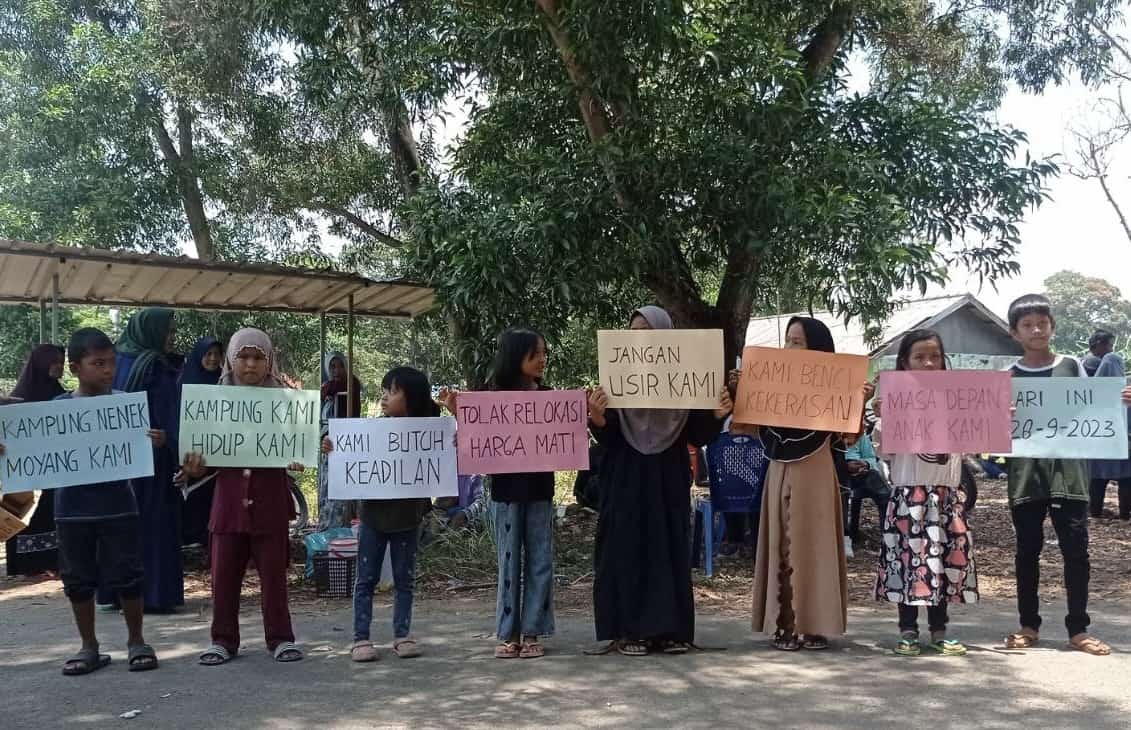
2 NOVEMBER | Rempang Island, Indonesia: Thousands of indigenous people are facing forced relocation to make way for a state-backed ‘Eco City’ centred around industry, trade, and tourism. 16 ancient villages will be cleared. XR Makassar is organising a social media solidarity campaign to pressure the government to change course.
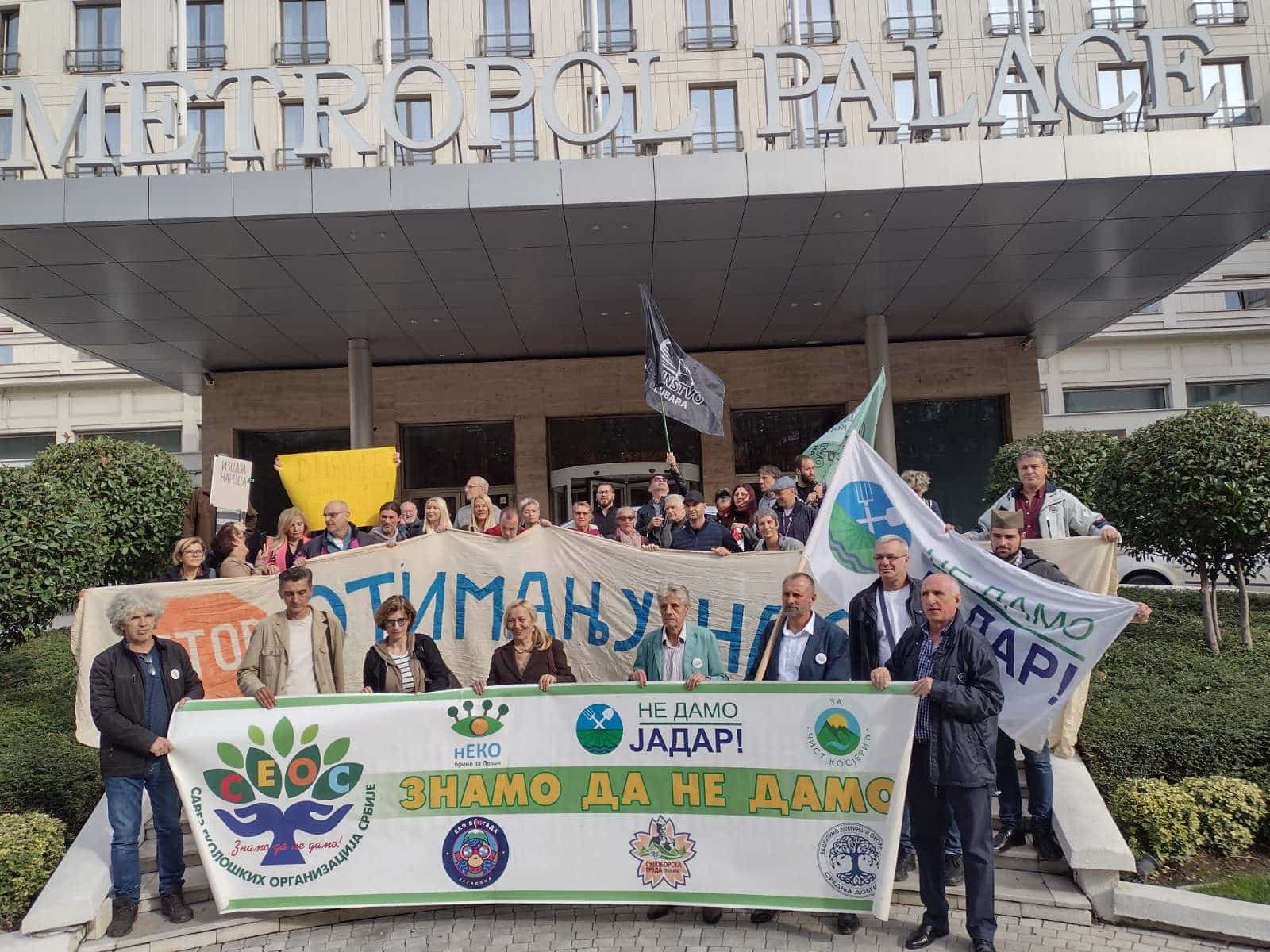
7 NOV | Belgrade, Serbia: Rebels join other ecoactivists to storm a conference on ‘sustainable mining’, where the government plans to sell access to Serbia’s rich mineral deposits. XR Serbia had asked to be part of a panel discussion about mineral extraction, but were turned down. They showed up anyway, and called for a new economy and a new society focused on the needs of all living beings, not just a handful of ultra-wealthy shareholders and politicians.
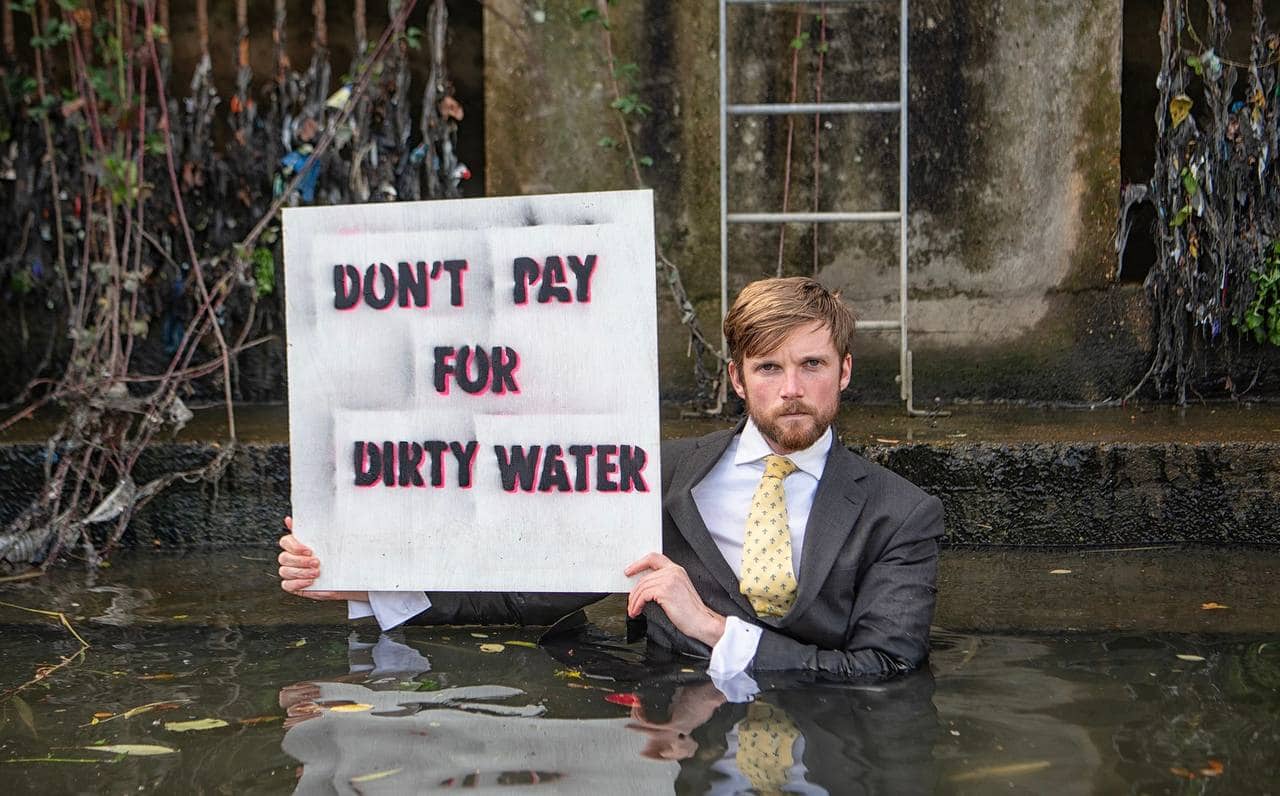
15 NOV | UK: XR UK launch ‘Don’t Pay For Dirty Water’, a campaign calling for a boycott of the wastewater charge in water bills. Water privatisation in the UK has led to billions in profits for shareholders, but rivers polluted with sewage for everyone else. Raw sewage is being dumped thousands of times a day by water companies looking to maximise profits.
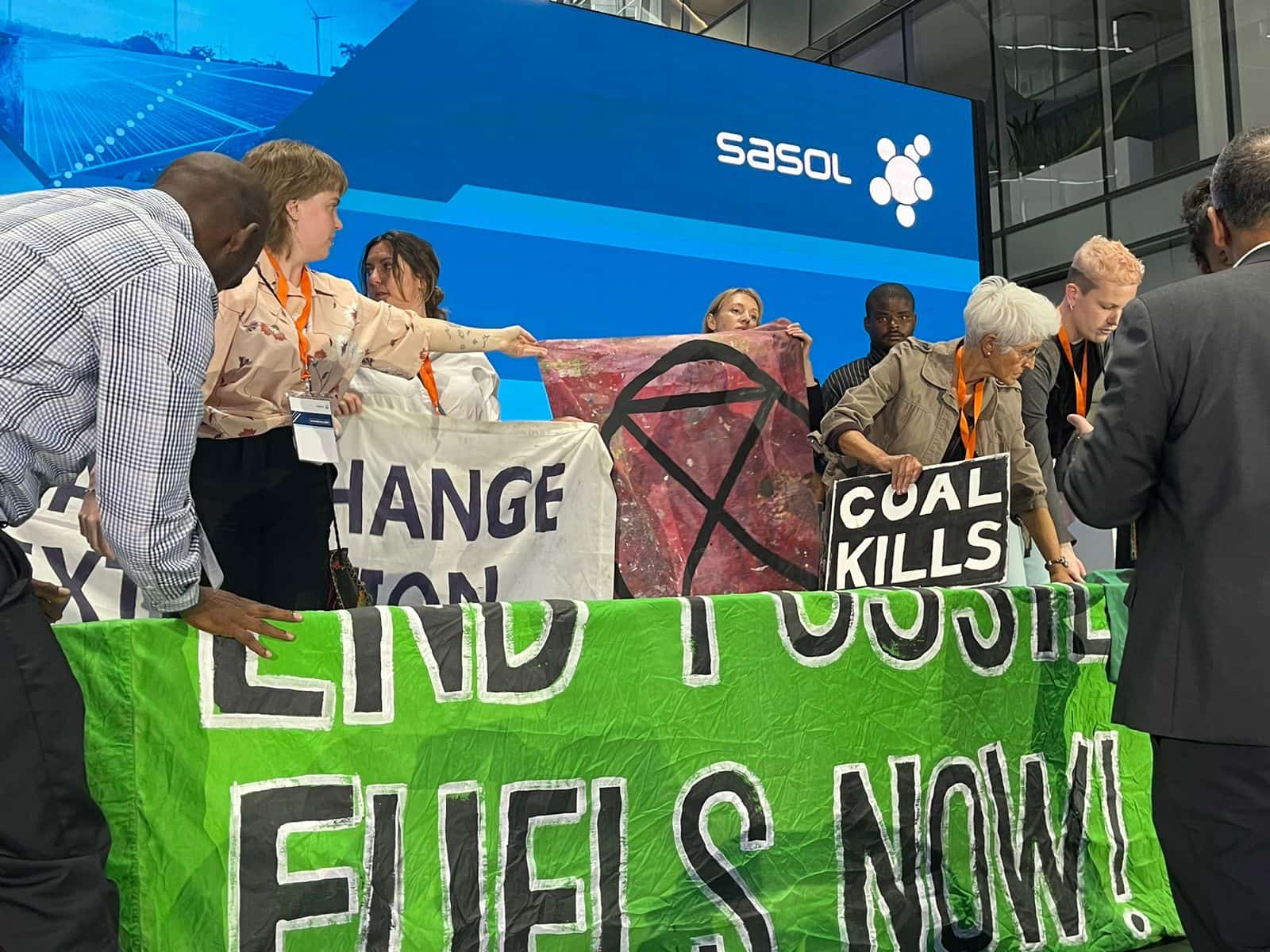
17 NOV | Johannesburg, South Africa: XR Vaal and XR Gauteng join other groups to disrupt Sasol’s Annual General Meeting. 15 activists stormed the stage and read testimonies from communities across South Africa who have been ruined by the energy, chemical, and mining giant’s pollution. Sasol’s executives offered the activists a 20-minute meeting behind closed doors. When the activists insisted it take place publicly, the executives chose to cancel the AGM.
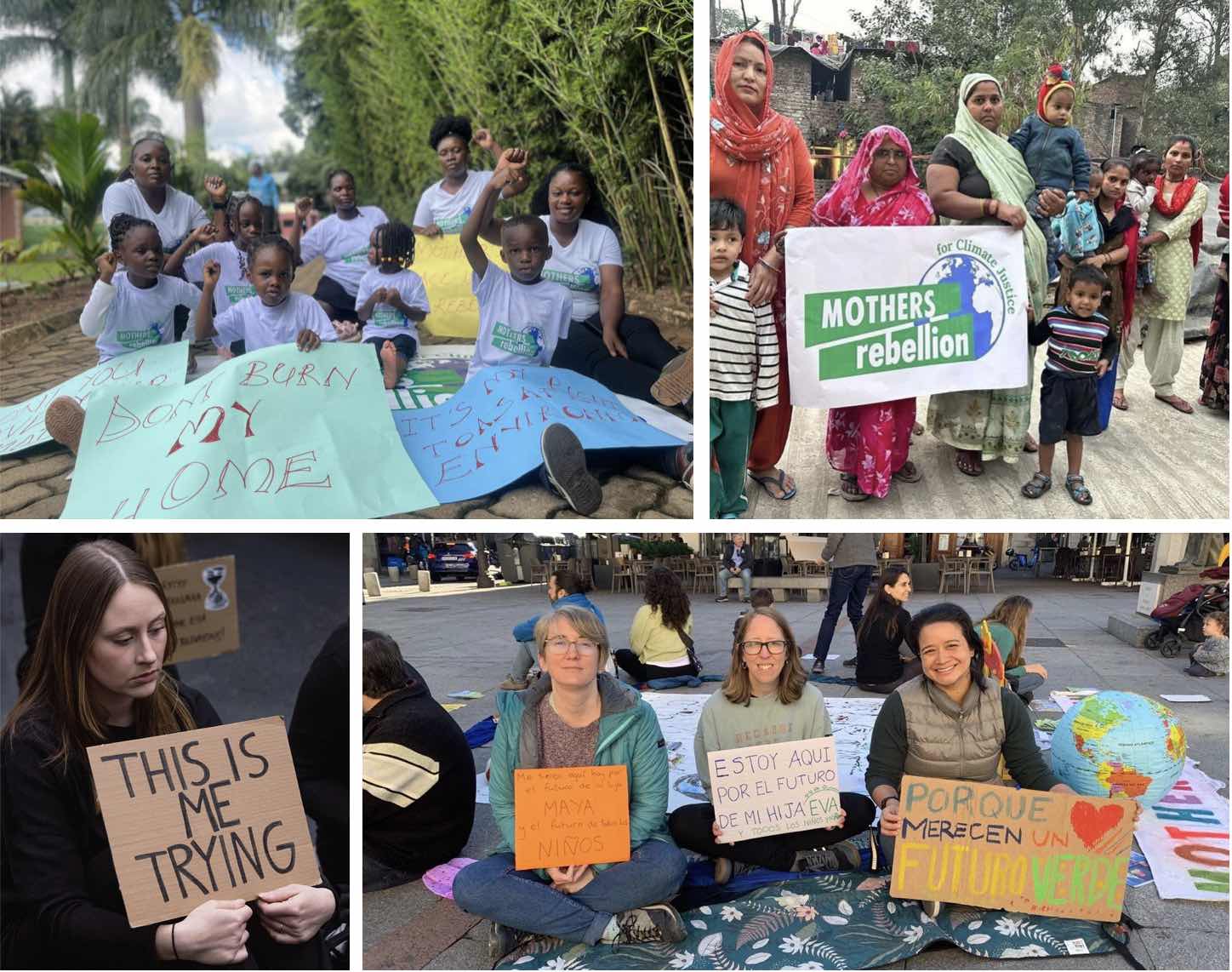
17–19 NOV | Global: Mothers Rebellion organise a 3rd global wave of action, with circles of mothers and allies forming in over 30 countries across 6 continents to highlight the urgent risks that children are facing due to runaway global heating. Photos (clockwise from top left): Kampala Uganda, Delhi India, Madrid Spain, Helsinki Finland.
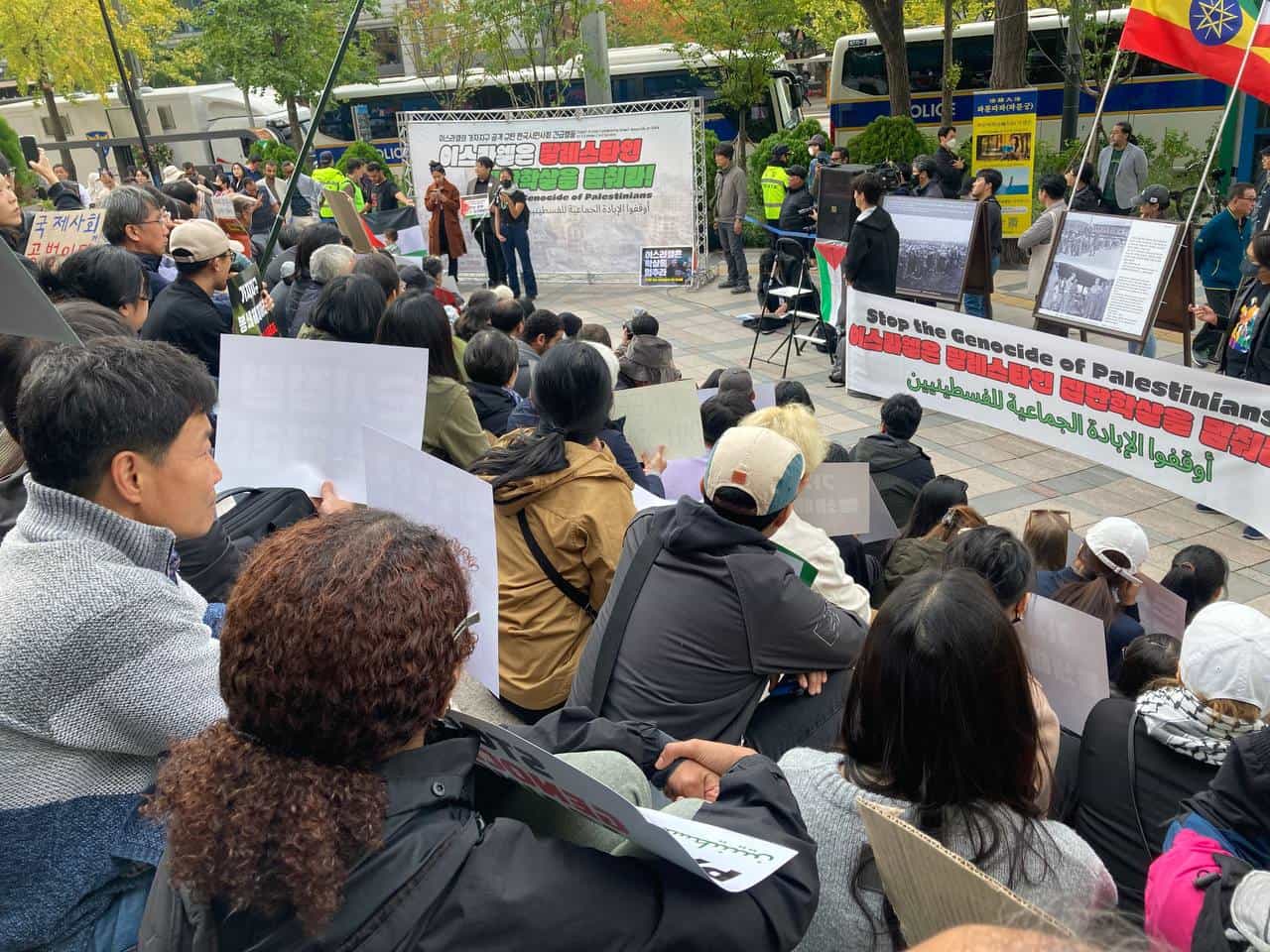
21 NOV | Seoul, South Korea: XR Korea joins other activist groups to condemn Israel's invasion of Gaza and the many thousands of innocent civilians that have been killed. Shoes were laid out in a public square to commemorate the victims.
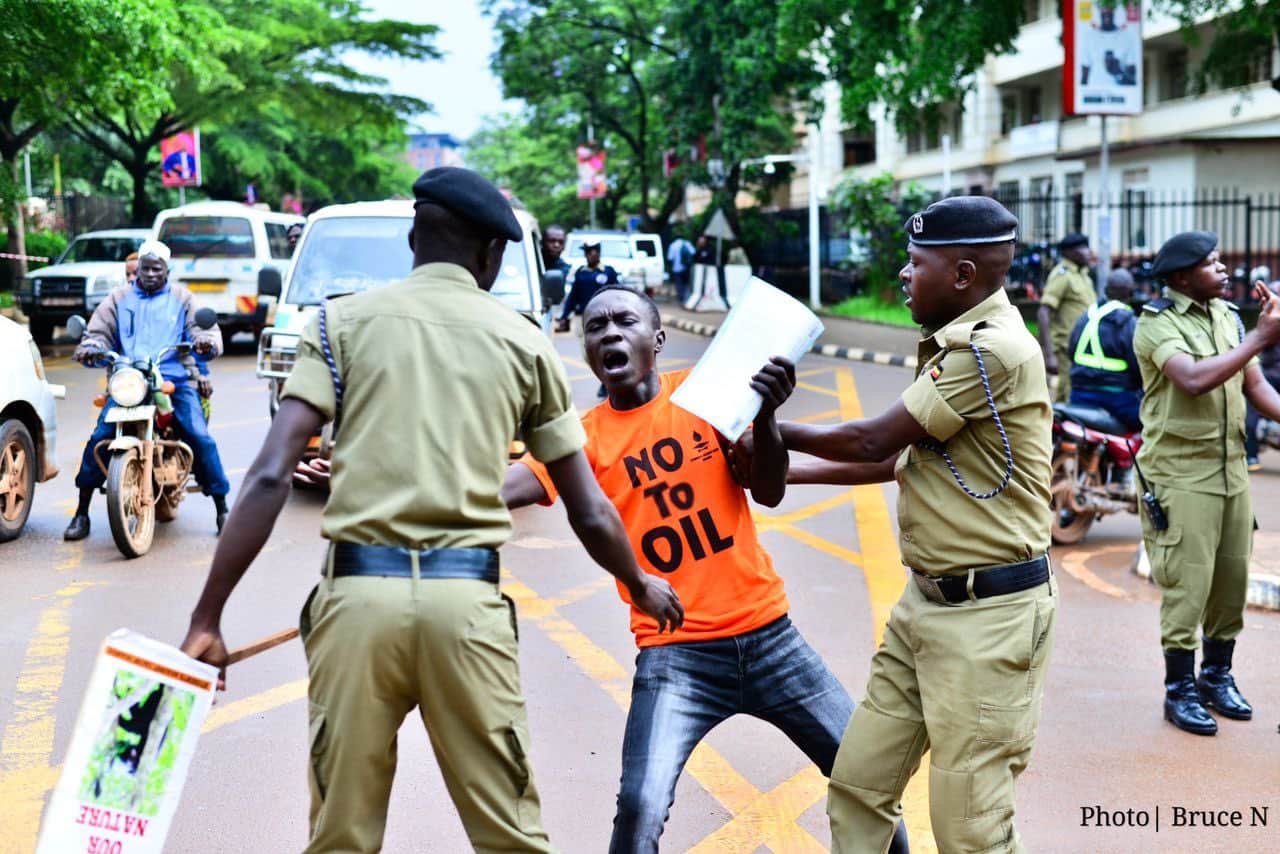
24 NOV | Kampala, Uganda: Student activists march to parliament to deliver a petition against EACOP. 7 were arrested, beaten in police cells, and after four days, remanded to prison, where they still remain. At COP28, the Total CEO backing EACOP was confronted about the arrests and promised to call for their release.
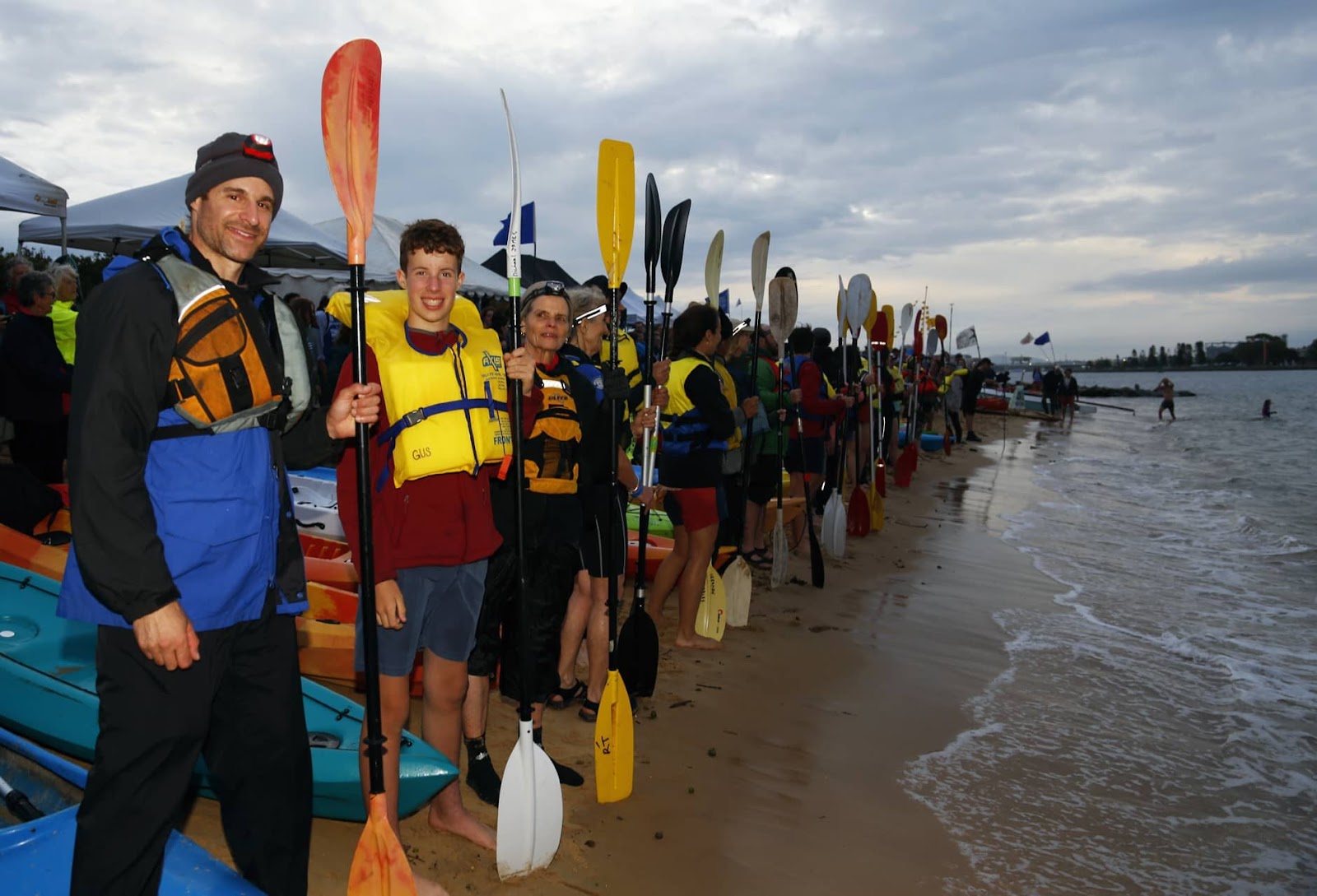
24–27 NOV | Newcastle, Australia: 3000 activists, including rebels, take part in a four-day blockade of the world’s largest coal port. The People’s Blockade, organised by Rising Tide, was the largest peaceful civil disobedience protest for climate action in Australia’s history. 109 people were arrested for demanding an end to new coal projects - the youngest was aged 15 and the oldest 97.
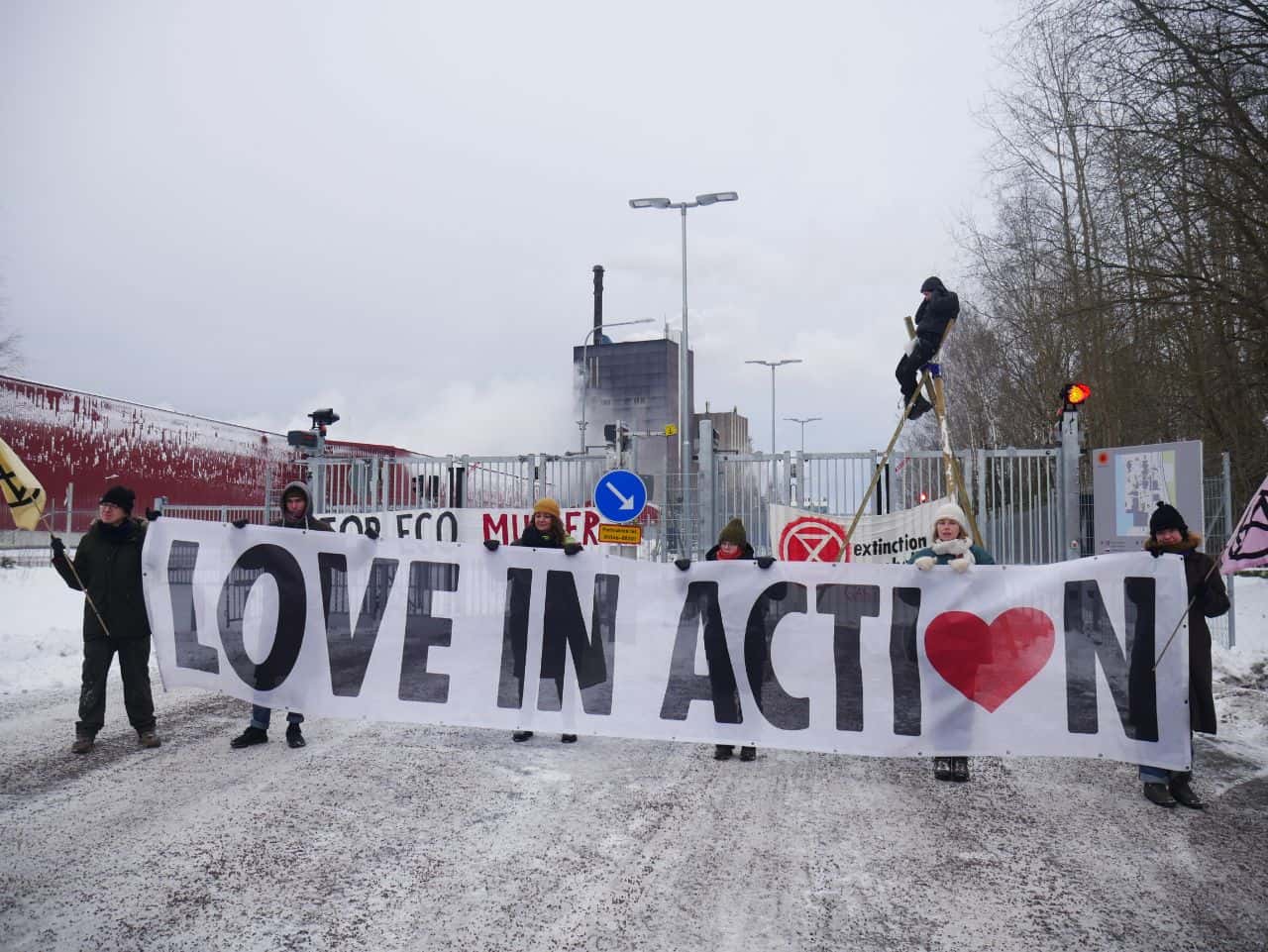
25 NOV | Gävle, Sweden: Rebels team up with Forest Rebellion and other groups to blockade a pulp mill run by Stora Enso. The Swedish-Finnish forest giant owns pulp mills and eucalyptus monocultures in Brazil and Uruguay that are linked to ecocide, indigenous dispossession, and money laundering. Find out more about Stora Enso’s litany of crimes and why it is uniting activists across Sweden, Finland, and Latin America.
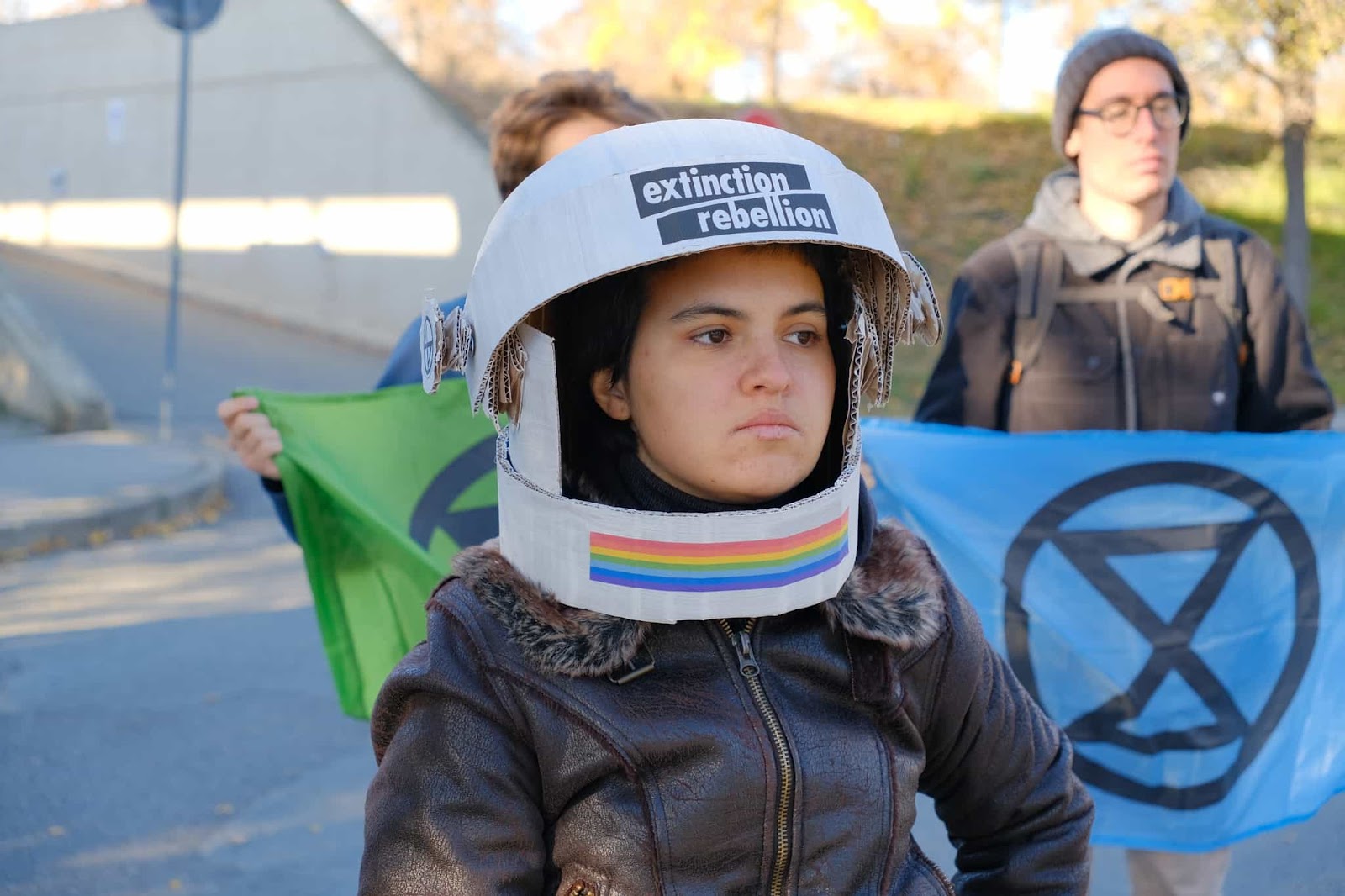
28 NOV | Torino, Italy: Rebels disrupt a major international military and aerospace convention. 3 activists harnessed themselves to a walkway overlooking its entrance and dropped banners. The war industry destroys life and is responsible for 5% of global emissions. Despite this, military spending is ballooning across Europe.
Must Reads
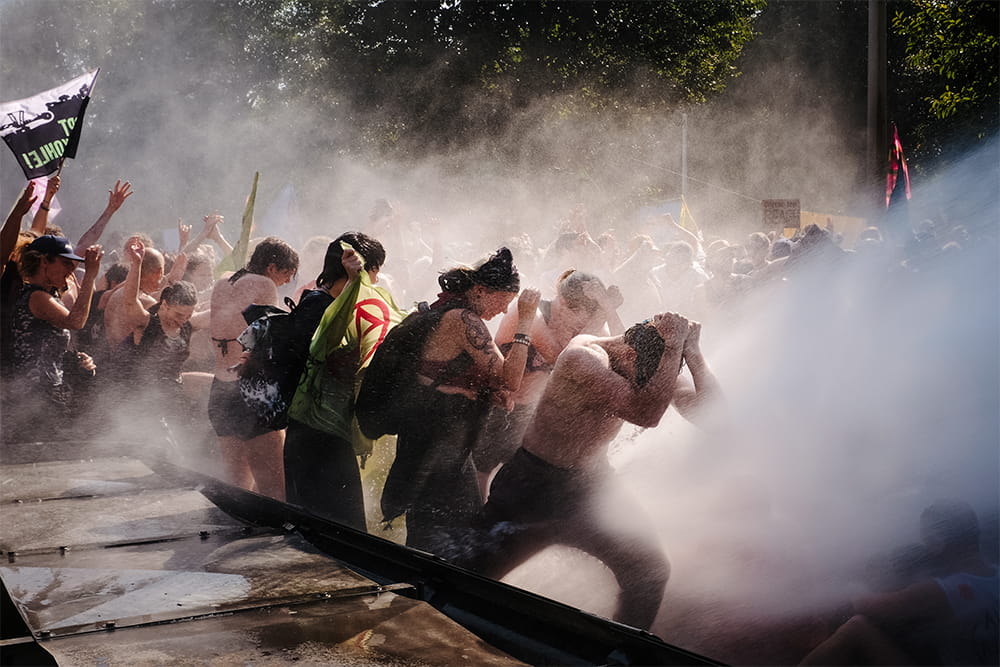
Police water-cannon rebels on the 1st day of a historic 27-day highway blockade in September against fossil fuel subsidies. This image by @maarten.photomic came 2nd in the XR Global Photography Contest - see more in Announcements.
Documentary: Breathless (28 mins)
The BBC investigates the devastating health impact of gas-flaring on communities living near oil fields. Among the case studies is the UAE, where gas-flaring by state oil company Adnoc is causing asthma, lung disease, and cancer, but no one speaks out for fear of being imprisoned.
Video: BBC Interviews Roger Hallam (51 mins)
The XR co-founder tries and fails to make a complacent BBC journalist emotionally engage with the climate crisis in this fascinating debate. The link takes you to Hallam’s blog where you can also find his verdict on COP28 - run by fascists, legitimised by liberals, and facilitating the greatest holocaust in human history. A tough verdict, but on current evidence difficult to argue with.
Article: Can XR’s Surprise Success in the Netherlands Be Replicated?
An investigation into how XR Netherlands’ sustained blockade of the A12 motorway led to a political breakthrough over fossil fuel subsidies, how that victory has inspired new rebel blockades across Europe, and whether such success can be replicated.
Report: Climate Equality - A Planet for the 99%
The richest 1% of humanity produces more carbon emissions than the poorest two thirds combined, and will cause the heat-related deaths of 1.3 million people over the coming decades. That is the devastating finding of this report by Oxfam, which goes on to call for hefty taxes on the super-rich and fossil fuel companies.
Article: How Colonial Rule Radically Shifts Responsibility for Climate Change
Carbon Brief calculates the historical carbon emissions of countries, but makes colonial powers accountable for the emissions of colonised countries while they controlled them. These more just figures still result in the US and China topping the list, but the old European colonial powers see their share of emissions rocket, while former colonies see their shares drop. For example, the UK’s total emissions nearly double, while India’s fall by 15%, placing it below the UK in the table.
Announcements
XR Global Photography Contest: Top 3 Images!
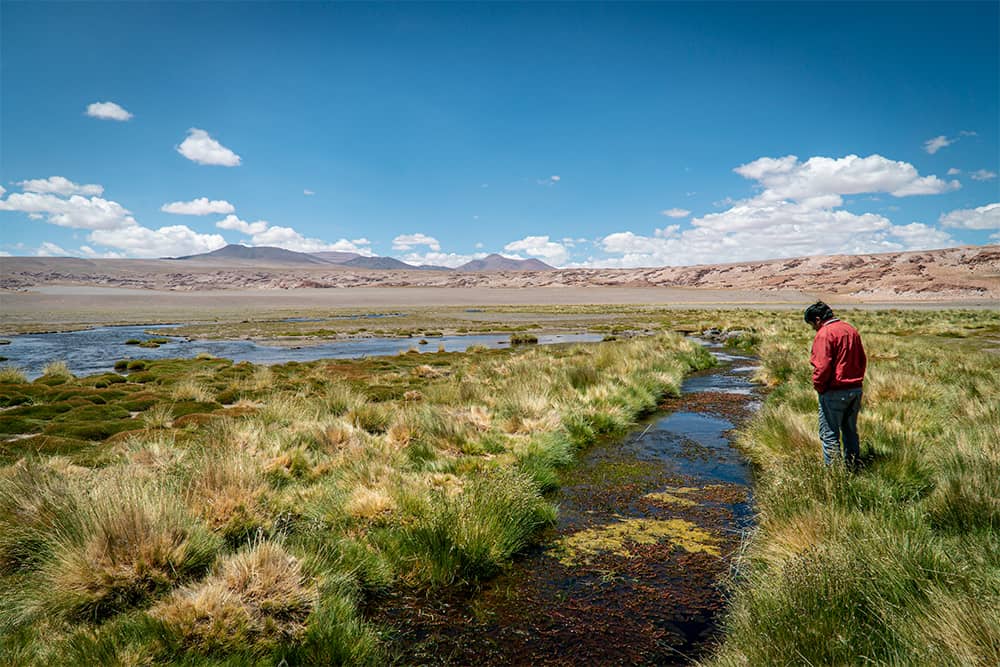
The Atacameños del Altiplano community chief looks over the Los Patos river, from which water is extracted for lithium production in Catamarca, Argentina. This image by @gastonbejas came 3rd in the XR Global Photography Contest.
The first XR Global Photography Contest has closed, and these three photographs were chosen via public vote from a shortlist of 12 picked by a panel of judges. The images, themed around water, will be part of a travelling exhibition and an online exhibition, and the 12 shortlisted images will feature in a special calendar.
The Judges Panel found choosing the shortlist a challenging task. The photographs were not only visually stunning but also powerful communicators of environmental issues, amplifying the voices of people too often ignored. They appreciate the commitment of all entrants to using photography to drive positive change, and look forward to continued collaboration.
Thank you
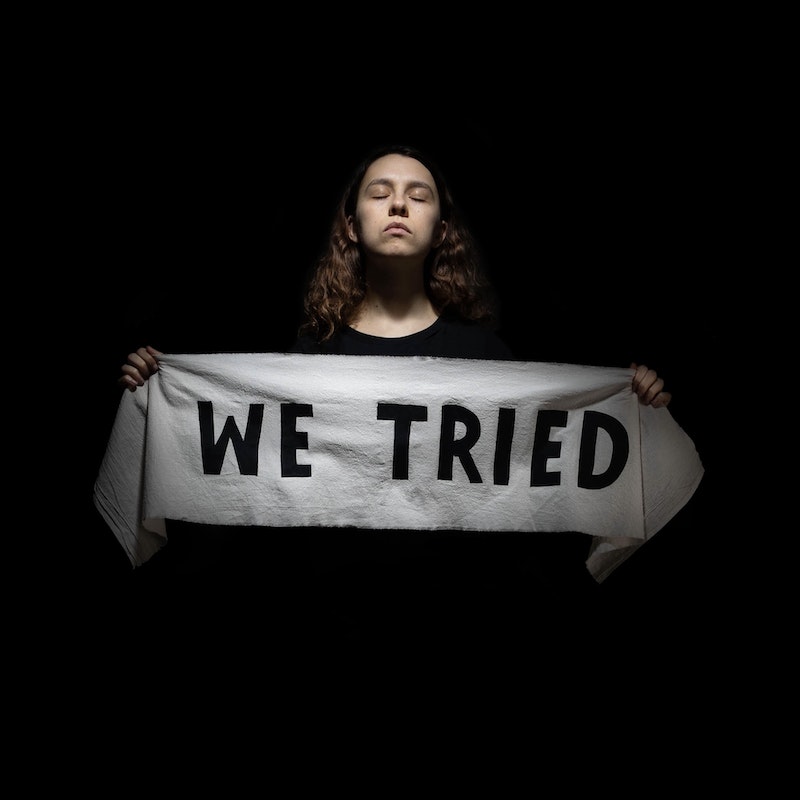
29 NOV | London, UK: A Just Stop Oil activist is arrested for singing her protest song “We Tried” outside one of the many homes of the British Prime Minister. Make the song a Christmas No.1 by buying it on iTunes. All proceeds go to climate causes.
Thank you for reading, rebel. If you have any questions or feedback, we want to hear from you. Get in touch at xr-newsletter@protonmail.com
This newsletter is brought to you by XR Global Support, a worldwide network of rebels who help our movement grow. We need money for this crucial work.